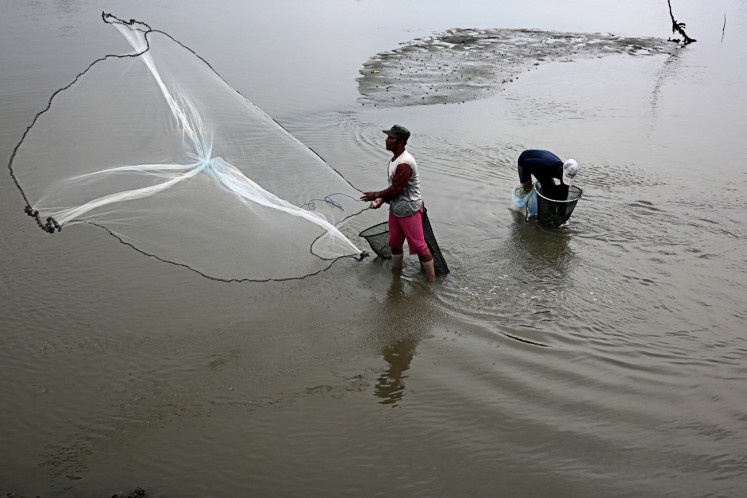Popular Reads
Top Results
Can't find what you're looking for?
View all search resultsPopular Reads
Top Results
Can't find what you're looking for?
View all search resultsOpposing a commodified game of violence
Fajar Hidayah School, Tuesday, Aug
Change text size
Gift Premium Articles
to Anyone
F
ajar Hidayah School, Tuesday, Aug. 24, 2010. We were having day prayers together, when we started hearing curses and obscenities coming from the main gate. The prayers continued, albeit without full concentration. As if ignoring the interruption, teachers and students continued to get ready to go home.
Walking past numerous anxious and scared kindergarten students and their parents and maids, I reached the gate to find several people who looked like street thugs shouting, jeering and (strangely) laughing, as they expressed their demand for around Rp 2 billion — which they said was an unpaid debt.
Taking a couple of steps closer, I told the thugs about the hundreds of children listening to their curses.
I tried to persuade them to stop, telling them that they were psychologically damaging the students, the third party who didn’t understand and therefore should not be made to witness such verbal violence.
But the group reacted very badly. One of the members grabbed me from behind and threatened to start using his fists if I kept asking them to stop. I think he was actually waiting for a physical response. If I had punched or kicked him, for instance, I would have been guilty in the eyes of the police. For this reason, they also did not physically harm anyone.
They seemed to clearly understand Indonesian criminal law and the way police usually handle such cases. The whole attack was an attempt to damage the school’s image, while avoiding getting themselves into legal trouble.
This was not a hasty conclusion. Rp 2 billion is a lot of money. If there was a problem, why didn’t “the boss” of the intruders file the case through official channels to police or a civil court? Why would he hire street thugs?
And there was something more bizarre I found in my attempts to investigate. While this case has caused unrest for several years and has been officially reported to the police by the school, it would not end anytime soon, but will be maintained and even commodified.
I refer to a land dispute not far from here that was not adjudicated in a civil court when it emerged several years ago. The first disputant, who claimed himself to be the legal owner of the site, considering the complicated procedures involved in taking his dispute to court, decided to free his land using a group of thugs (called “Banten”) from the other disputant, who had earlier been using another group (called “Ambon”) to occupy the land.
There was no cruel violence, but a peculiar money-oiled mediation involving the police, first disputant, Banten gang and Ambon gang. The first disputant agreed to provide a sum of money to seal an unwritten peace treaty between the groups. He could then partition the land and the problem was supposed to be over. However, once the “peace” money ran out, the case flared up again. If he wanted to be safe, he would have to pay again.
And now, the same modus operandi was being forced on the Islamic school. A police official even joked that the school would be an ATM for the thugs.
Why do these gangs continue to exist and why do they seem untouchable? How can they keep intimidating people and get power and economic advantages from their actions? What is the proper way to deal with them?
The first answer was provided by the directors of the Islamic school. They realized that such exploitation would have to be stopped at all cost. Having enough evidence of their innocence before the law, they tried to make sure everybody understood that what the gangsters were doing was ridiculous and criminal.
“Let’s show off our strength”, they said, “if we look weak, they will keep doing it.” But to take this stance they would have to pay a price: some students may change schools and candidates may cancel their enrollments. The image of the school may be affected and the future of its employees could be put at risk.
Second, the directors tried to remind police officials about the rights of citizens and institutions to exist peacefully and safely without paying extra and illegal fees. In what sense could we accept that a school should pay to ensure peace and safety for its students and employees in their own land and state?
However, it’s not so easy. For the police, harm and violence caused by thugs and the like is increasing and in many cases unstoppable. There are so many factors at play. For lower ranking police officers, for example, in such cases it’s often difficult to act properly not only because of typical obstacles and challenges including a lack of resources, but also because of the weaknesses of legal articles to guarantee justice and the inability of the state to facilitate a legal processes and follow-up investigations (M. Tito Karnavian, 2010).
This is perhaps why the directors of the school tried to use non-government channels and lobbying. In relation to the violence in front of the children, they hope to file the case to the National Commission for Children. While lawyers and officers involved keep asking for their share, they have decided to take the case to the National Commission on Human Rights.
Finally, whether they are successful or not, the directors tell us there needs to be people or community members who bravely traverse the legal processes. If bribery and illegal levies continue, for example, we’ll always be in this game of violence, a chronic social pathos.
If there was a problem, why didn’t “the boss” of the intruders file the case through official channels to police or a civil court?
The writer is currently a researcher at Paramadina Foundation, Jakarta.










